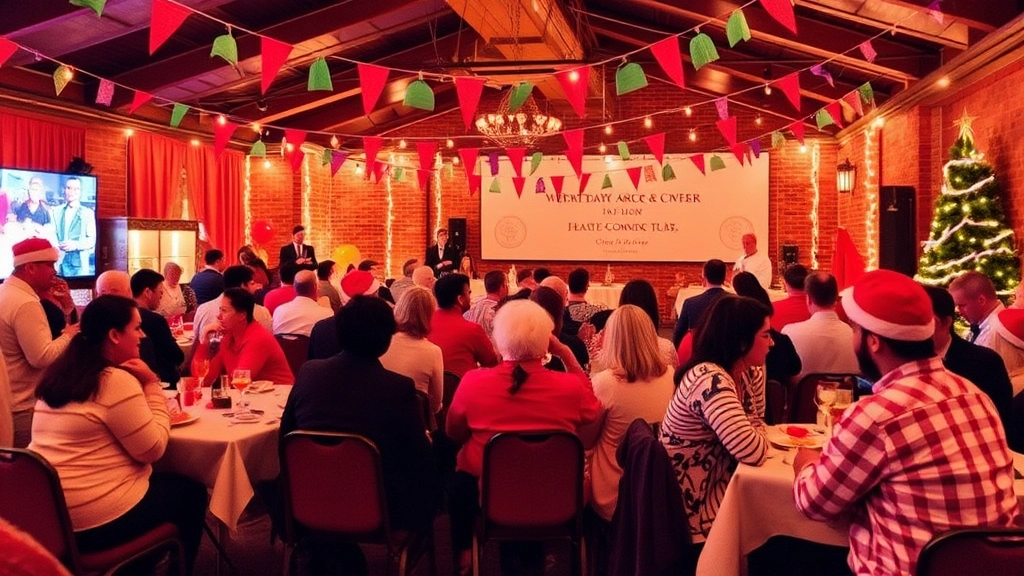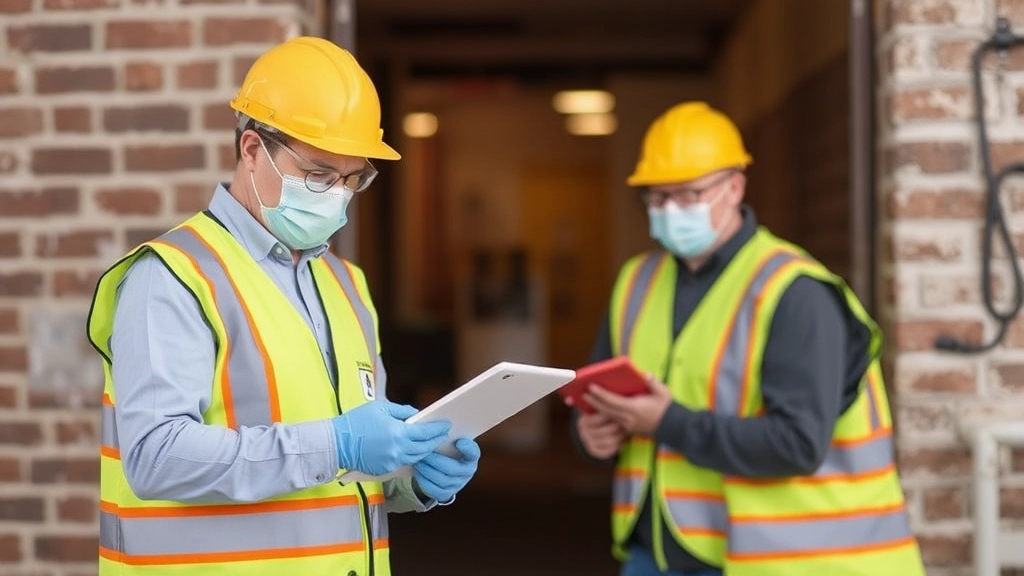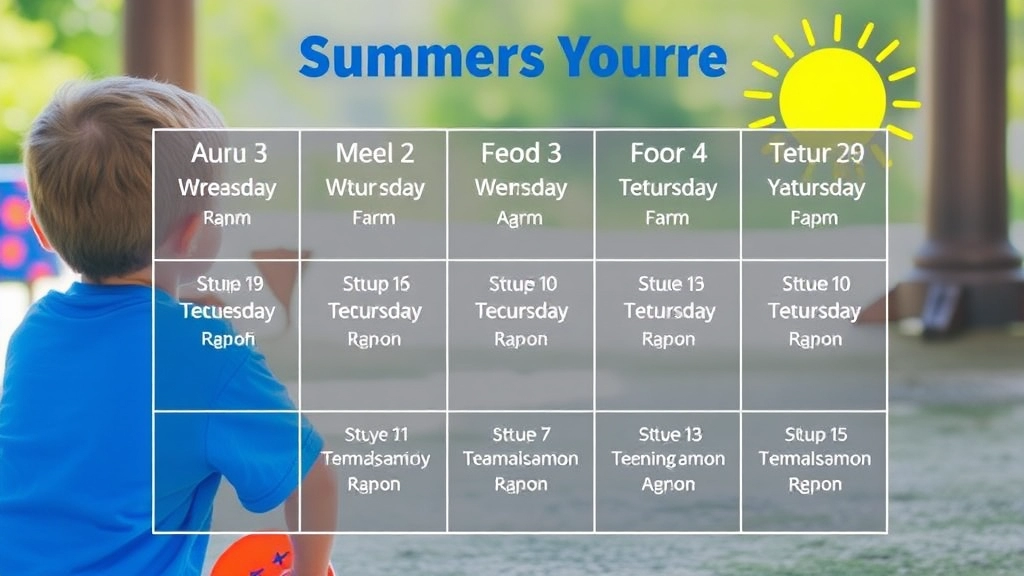Summer Camps: A Quintessential Experience
Summer camps are a quintessential part of childhood, offering a blend of adventure, learning, and fun. But what really makes a camp experience unforgettable? It’s the meticulously planned Summer Camp Daily Schedule that ensures every moment is both engaging and enriching. From the early morning wake-up call to the final lights-out routine, each part of the day is crafted to provide a balanced mix of structured activities and free play, ensuring campers make the most out of their time.
A Typical Day at Camp
In this article, we’ll walk you through a typical day at camp, highlighting:
- Morning activities
- Lunch and midday breaks
- Afternoon adventure sessions
- Evening programs
Additional Insights
We’ll also delve into:
- Special theme days
- Health and safety protocols
- The importance of parental communication
Whether you’re a parent curious about what your child will experience or a camper eager to know what lies ahead, this comprehensive guide will give you a clear picture of the exciting and well-rounded daily schedule that makes summer camp a cherished memory.
Typical Morning Activities at Summer Camp
What’s the first thing that pops into your head when you think of summer camp mornings? Is it the sound of birds chirping, the smell of fresh pine, or maybe the thought of a hearty breakfast? Yep, mornings at summer camp are all about kicking off the day with a bang. Let’s dive into what a typical morning looks like at camp.
Wake-Up Call and Morning Routine
First things first, we’ve got the wake-up call. No, it’s not your annoying alarm clock; it’s usually a friendly but firm counsellor making sure everyone’s up and ready to seize the day. Here’s how we roll:
- Rise and Shine: Campers wake up to the sound of nature or a gentle nudge from a counsellor.
- Morning Hygiene: Time to brush those teeth, wash up, and get dressed for the day.
- Cabin Clean-Up: A quick tidy-up of the cabin. It’s all about teamwork and responsibility.
Breakfast
After shaking off the morning grogginess, it’s off to the dining hall for breakfast. And trust me, it’s not just cereal and milk:
- Hearty Options: Think pancakes, scrambled eggs, and fresh fruit.
- Dietary Needs: We cater to all dietary preferences, from vegetarian to gluten-free.
- Social Time: Breakfast is also a great time for campers to chat and bond with their cabin mates.
Morning Assembly
Next up is the morning assembly. This is where we gather everyone to set the tone for the day:
- Announcements: Important updates and the day’s schedule.
- Songs and Cheers: Camp spirit is high, so expect some singing and cheering to get everyone pumped.
- Daily Themes: Sometimes, we introduce a theme for the day, like âTeamwork Tuesdayâ or âWacky Wednesday.â
Activity Rotations
Now, onto the fun partâmorning activities! These are designed to get campers moving, learning, and having a blast:
- Sports: Football, basketball, or even a friendly game of tag.
- Arts and Crafts: From painting to making friendship bracelets.
- Nature Walks: Exploring the great outdoors and learning about local flora and fauna.
- Skill Workshops: Maybe it’s archery, maybe it’s cookingâthere’s always something new to try.
Snack Break
Mid-morning, we take a quick break to refuel:
- Healthy Snacks: Fruit, granola bars, or a handful of nuts.
- Hydration: Water stations are everywhere to keep everyone hydrated.
Personal Story: My First Summer Camp Morning
Let me tell you about my first summer camp morning. I was a bundle of nerves and excitement. The wake-up call was a bit of a shock, but once I got to breakfast and saw the spread, I knew I was in for a treat. By the time we hit the morning assembly, I was singing along like I’d been there for years. And the activities? I tried archery for the first time and absolutely loved it. That morning set the tone for an unforgettable summer.
So, there you have itâa typical morning at summer camp. It’s all about starting the day with energy, excitement, and a sense of community. Whether it’s your first time or you’re a seasoned camper, the mornings here are designed to make you feel right at home.
For more information on how to make the most of your camp experience, check out our Ultimate Packing Guide and discover the rich culture and activities that make summer camps so special.
Lunch and Midday Break Schedule

Ever wondered how we keep the kids energised and happy at summer camp?
Let’s dive into the lunch and midday break schedule.
What’s for Lunch?
First things first, the food.
Kids are always hungry, right?
We make sure they get a hearty, balanced meal.
Think fresh sandwiches, fruits, veggies, and maybe a cheeky dessert.
No one’s going hungry on our watch.
Time to Chill
After lunch, it’s downtime.
We’ve got a solid midday break.
Kids can relax, chat with mates, or dive into a book.
It’s all about recharging those batteries.
Hydration Station
We’re big on hydration.
Water stations are everywhere.
Kids need to drink up, especially in the summer heat.
Activity Options
Some kids can’t sit still.
We get it.
So, we’ve got light activities.
Maybe a bit of arts and crafts.
Or a casual game of football.
Nothing too intense, just enough to keep them entertained.
Stories from the Field
Last summer, we had a kid, Jamie.
He wasn’t into relaxing.
Always on the go.
But after a few days, even Jamie looked forward to the midday break.
He’d grab a book and chill out.
Proof that everyone needs a bit of downtime.
Afternoon Adventure and Skill-Building Sessions
Ever wondered what makes a summer camp truly memorable for kids? It’s all about those afternoon adventure and skill-building sessions. Let’s break it down, no fluff, just the real deal.
Why Are Afternoon Sessions Important?
Kids are buzzing with energy after lunch. This is prime time to dive into activities that not only entertain but also build essential life skills. Parents often ask, “What will my child gain from these sessions?” Here’s the lowdown:
- Confidence Boost: Trying new things in a safe environment helps kids feel more capable.
- Teamwork: Many activities require collaboration, teaching kids how to work well with others.
- Resilience: Facing challenges and overcoming them builds grit.
Types of Activities
So, what exactly do these sessions include? Here’s a snapshot:
- Outdoor Adventures: Think hiking, canoeing, and zip-lining. These activities get the adrenaline pumping and teach kids about nature and survival skills.
- Creative Arts: From painting to drama, these sessions let kids express themselves and discover hidden talents.
- Sports and Games: Football, basketball, and even quirky games like capture the flag. These activities are great for physical fitness and instilling a sense of fair play.
- STEM Projects: Building rockets, coding, or simple science experiments. These sessions spark curiosity and problem-solving skills.
Real Stories, Real Impact
I remember a camper named Jake who was initially terrified of heights. During the zip-lining session, he was hesitant but decided to give it a shot. The look on his face after completing the course was priceless. He learned that courage isn’t the absence of fear but the triumph over it.
Structuring the Sessions
To make sure every kid gets the most out of these sessions, we follow a structured approach:
- Warm-Up: Start with a brief introduction and warm-up exercises.
- Main Activity: Dive into the core activity, whether it’s a sport, art, or adventure.
- Cool Down and Reflection: End with a cool-down period and a quick chat about what they learned or enjoyed.
Safety First
Safety is non-negotiable. Here’s how we ensure it:
- Qualified Instructors: All activities are led by trained professionals.
- Equipment Checks: Regular checks to ensure all gear is in top condition.
- First Aid Ready: First aid kits and trained staff are always on hand.
For more information on creating a memorable camp experience, check out our summer camp weekly themes guide.
Evening Programs and Entertainment

Ever wonder what happens after the sun sets at summer camp?
You’re not alone.
Evening programs and entertainment are where the real magic happens.
Why Evening Programs Matter
Kids are usually buzzing with energy from the day’s activities.
But what if they could channel that energy into something fun and memorable?
That’s where our evening programs come in.
We’ve got a mix of activities that keep everyone engaged and excited.
Types of Evening Entertainment
1. Campfire Stories:
Nothing beats a classic campfire.
We gather around, share spooky tales, and toast marshmallows.
It’s the perfect way to wind down and build camaraderie.
2. Talent Shows:
Got a hidden talent?
This is your time to shine.
From singing to magic tricks, everyone gets a chance to showcase their skills.
3. Movie Nights:
Sometimes, all you need is a good film.
We set up an outdoor screen and let the kids relax under the stars.
4. Night Hikes:
For the adventurous souls, night hikes are a must.
Armed with torches, we explore the wilderness and learn about nocturnal creatures.
Keeping It Fresh
We mix things up to keep it interesting.
One night might be a dance party, the next a scavenger hunt.
Variety is key.
Real Stories, Real Fun
I remember one night, a kid named Sam absolutely nailed his stand-up comedy routine at the talent show.
Everyone was in stitches.
Moments like these make the camp experience unforgettable.
Wrapping Up the Evening
By the end of the night, kids are usually tired but happy.
We gather for a final chat, sharing highlights of the day.
Then it’s off to bed, ready to do it all over again tomorrow.
Why It Works
- Engagement: Keeps kids entertained and involved.
- Variety: Ensures no two nights are the same.
- Memories: Creates lasting memories and friendships.
Quiet Time and Lights Out Routine
Ever wonder how to get a bunch of energetic kids to wind down after a jam-packed day at camp? Trust me, it’s no easy feat. But we’ve got a system that works like a charm, and it’s all about quiet time and lights out routine.
Why Quiet Time Matters
First off, let’s talk about why quiet time is crucial. Kids need a break to recharge, and quiet time is the golden hour for that. It’s not just about getting them to sleep; it’s about giving their minds and bodies a chance to relax and reset.
The Pre-Bedtime Wind Down
So, how do we make this happen? Here’s the lowdown:
- Calm Activities: We start with some low-key activities like reading, journaling, or even a bit of quiet drawing. This helps ease the transition from the high-energy day to a more relaxed state.
- Story Time: We gather everyone for a group story. The tales are usually fun but soothing, perfect for winding down. Think campfire stories but without the fire.
- Mindfulness Exercises: Sometimes, we throw in a few simple mindfulness exercises. It’s like a mini meditation session that helps the kids calm their minds.
Setting the Scene
Creating the perfect environment for sleep is key. Here’s how we set the stage:
- Dim the Lights: We gradually dim the lights in the cabins. This signals to the kids that it’s time to start winding down.
- Comfortable Bedding: We make sure everyone’s got their comfy sleeping bags and pillows. A good night’s sleep starts with being comfortable.
- White Noise: Sometimes, we use a bit of white noise or soft music to drown out any background sounds. It helps create a serene environment.
The Lights Out Routine
When it’s finally time for lights out, we stick to a consistent routine. Here’s the step-by-step:
- Final Bathroom Break: Everyone gets one last chance to hit the bathroom. No one wants to wake up in the middle of the night!
- Lights Out: We turn off the lights at the same time every night. Consistency is key.
- Counsellor Check-Ins: Our counsellors do a quick check to make sure everyone’s settled and comfortable. They’re always nearby if anyone needs anything.
Troubleshooting Sleep Issues
Sometimes, despite our best efforts, a few kids might have trouble falling asleep. Here’s what we do:
- One-on-One Time: A counsellor might spend a few minutes with them, talking quietly or offering some reassurance.
- Extra Comfort: Sometimes, a little extra comfort like a favourite stuffed animal can make all the difference.
Real Stories, Real Success
I remember one camper, Jamie, who had a tough time adjusting to the camp’s sleep schedule. The first few nights were rough, but with a bit of extra attention and some tweaks to the routine, Jamie was soon sleeping like a log. It’s all about finding what works for each kid.
For more tips on creating a comfortable sleeping environment, check out our guide on cabin bunk safety and design tips. Additionally, if you’re looking for fun pre-bedtime activities, our article on indoor summer camp games has some great ideas to keep kids entertained while winding down.
Special Theme Days and Events

Ever wonder what makes a summer camp truly unforgettable?
It’s the Special Theme Days and Events.
These are the days that turn a regular camp experience into something legendary.
Why Are Special Theme Days Important?
Let’s face it.
Kids get bored easily.
Routine can become a drag.
Special Theme Days break the monotony and inject a burst of excitement.
They give campers something to look forward to.
And trust me, the buzz around these days is electric.
Types of Theme Days
Here are some of the crowd favourites:
- Pirate Day: Think treasure hunts, pirate costumes, and a whole lot of “Arrr!”
- Superhero Day: Capes, masks, and saving the day.
- Olympic Day: Friendly competition, medals, and team spirit.
- Talent Show Night: Singing, dancing, magic tricks—everyone’s a star for the night.
How We Plan These Days
Planning is key.
Here’s how we do it:
- Brainstorm Ideas: We get input from both staff and campers.
- Set a Schedule: We slot these days into the camp calendar.
- Gather Supplies: Costumes, props, and materials are prepped in advance.
- Promote the Event: We build hype through announcements and posters.
Stories from Past Theme Days
One year, we had a “Medieval Day”.
Kids built cardboard castles, had jousting matches with pool noodles, and even crowned a camp king and queen.
Another hit was “Space Exploration Day”.
Campers created their own rockets and had a blast-off competition.
Benefits Beyond Fun
These days aren’t just about having a good time.
They also:
- Build Team Spirit: Working together on themed activities fosters camaraderie.
- Boost Creativity: Kids get to think outside the box.
- Create Memories: These are the stories they’ll tell for years.
How to Get Involved
Parents, you can join the fun too.
- Volunteer: Help out with planning or on the day itself.
- Provide Supplies: Donate costumes or props.
- Share Ideas: Got a cool theme in mind? Let us know!
Integration of Free Play and Structured Activities
Ever wonder how summer camps balance between free play and structured activities? It’s a common concern for parents and campers alike. You want your kids to have fun, but you also want them to learn new skills and stay safe. Let’s break down how we make it happen.
Why Balance is Key
First off, why even bother with balancing free play and structured activities? Here’s the deal:
- Free Play: This is where kids get to be kids. They explore, make friends, and develop social skills. It’s unstructured, and that’s the beauty of it.
- Structured Activities: These are planned sessions where kids learn specific skillsâthink archery, swimming, arts and crafts. They’re designed to teach, engage, and sometimes challenge the campers.
How We Do It
So, how do we integrate these two seamlessly? Here’s our game plan:
Morning Sessions:
- Kick-off with Energy: We start the day with a mix of light physical activities. Think yoga or a quick game of tag. This gets the kids moving and ready for the day.
- Skill-Building Blocks: These are scheduled in the morning when kids are most alert. We dive into activities like canoeing, rock climbing, or pottery. Each session is led by a pro who knows how to make learning fun.
Midday Break:
- Free Play Zones: After lunch, kids get a solid hour for free play. Whether it’s building sandcastles, playing football, or just chilling with new friends, this time is all theirs.
- Supervised but Free: While the kids are free to choose what they do, our staff is always around to ensure safety and jump in if needed.
Afternoon Sessions:
- Adventure Time: Post-break, we switch gears to adventure and exploration. This could be a nature hike, a scavenger hunt, or team-building games. These activities are structured but offer plenty of room for creativity and spontaneity.
Evening Wind-Down:
- Creative Free Play: Before dinner, there’s another window for free play but with a creative twist. Think of it as an open art studio or a mini talent show. It’s structured enough to provide direction but loose enough for kids to express themselves freely.
Real Stories from Camp
Let’s make it real with a story. Last summer, we had a camper named Max. He was shy and not too keen on structured activities. But during the free play sessions, he built an amazing treehouse with his friends. This caught the eye of our staff, who then encouraged him to join the woodworking class. By the end of camp, Max wasn’t just participating in structured activities; he was leading them.
The Takeaway
Balancing free play with structured activities isn’t just about filling up the day. It’s about creating an environment where kids can thrive, learn, and have fun. We’ve seen firsthand how this balance helps kids develop both socially and personally.
For more insights on creating a well-rounded camp experience, check out our Top Summer Camp Games and Activities Guide and learn about the Fun and Learning Combined in Summer Camp Activities.
Health and Safety Protocols During the Day

Worried about your kid’s safety at summer camp?
Yeah, I get it.
We all want our kids to have fun, but safety is non-negotiable.
Let’s dive into how we keep things safe and sound at camp.
Morning Health Checks
- Temperature checks: No one with a fever is joining the fun.
- Sanitisation stations: Hand sanitiser is everywhere.
- Daily health questionnaire: Simple questions to catch any early signs of illness.
Supervised Activities
- Trained staff: Our team knows their stuff.
- Buddy system: No kid is ever alone.
- First aid kits: Always within reach.
Hydration and Sun Safety
Dehydration and sunburn? Not on our watch.
- Water breaks: Scheduled throughout the day.
- Sunscreen stations: Reapply, reapply, reapply.
- Shaded areas: Plenty of spots to cool down.
Safe Play Areas
We check our play areas daily.
- Inspect equipment: No broken swings or dodgy slides.
- Clear paths: No tripping hazards.
- Soft landing zones: For those inevitable tumbles.
Emergency Procedures
We’re ready for anything.
- Evacuation drills: Practiced regularly.
- Emergency contacts: Always up-to-date.
- On-site medical staff: Ready to handle any situation.
Nut-Free Zones
Got a kid with allergies?
No worries.
- Nut-free policy: Strictly enforced.
- Allergy alerts: Staff are fully aware of each camper’s needs.
COVID-19 Measures
Still dealing with the pandemic?
We’ve got it covered.
- Mask policies: Depending on current guidelines.
- Social distancing: Where possible.
- Regular sanitisation: High-touch areas cleaned frequently.
Parental Updates
We keep you in the loop.
- Daily updates: Via email or app.
- Photos and videos: See your kid in action.
- Direct contact: Reach out to staff anytime.
Keeping it real, keeping it safe.
That’s our promise.
Health and safety protocols aren’t just rules; they’re how we ensure every camper has a blast without a hitch.
Got questions? Fire away.
We’re here to give you peace of mind.
Camper Check-In and Departure Procedures
Hey, ever worried about the chaos of camper check-ins and departures? Let’s dive into how we make this process smooth and stress-free for everyone involved. Whether you’re a parent, a camper, or part of our camp team, understanding these procedures can make all the difference.
Check-In: A Warm Welcome
The First Day Jitters
Remember that first day at camp? Excitement mixed with a bit of anxiety. We’ve all been there. Here’s how we tackle it:
- Staggered Arrival Times: To avoid the rush, we schedule staggered arrival times. This means less waiting and more personal attention.
- Friendly Faces: Our staff are ready to greet you with smiles and help with luggage. It’s like arriving at a friend’s house.
- Quick Health Checks: We do a brief health screening to ensure everyone’s fit and ready for fun. Safety first, always.
Registration Made Easy
No one likes long queues. So, we’ve streamlined the registration process:
- Pre-Registration Online: Complete most of the paperwork before you even arrive. Easy peasy.
- Express Check-In Lanes: For those who’ve pre-registered, we’ve got express lanes. Think of it as the fast track to fun.
Departure: A Smooth Goodbye
Packing Up Memories
Leaving camp is bittersweet. You’ve made new friends and unforgettable memories. Here’s how we handle departures:
- Organised Packing: We help campers pack their bags the night before. No last-minute panic.
- Lost and Found: We set up a lost and found station. Because someone will forget a sock. Always.
Efficient Pick-Up Process
Parents, we know you’re eager to hear all about camp. Here’s how we keep things moving:
- Scheduled Pick-Up Times: Similar to check-in, we have staggered pick-up times. It’s all about avoiding traffic jams.
- Feedback and Farewell: We love hearing about your camper’s experience. Quick feedback forms help us improve, and we send you off with a heartfelt goodbye.
Keeping It Real
Stories from the Ground
I remember one parent telling me how they were worried about their shy child fitting in. By the end of the week, that kid was leading campfire songs. It’s these transformations that make the process worthwhile.
FAQs and Common Concerns
- What if I’m late for pick-up? No worries, just give us a call. We’ve got a plan for that.
- Can friends check-in together? Absolutely! Just let us know in advance.
Parental Communication and Updates
Worried about how your child is doing at camp?
You’re not alone.
It’s natural to want regular updates and know they’re safe and happy.
Here’s how we keep you in the loop:
FAQs about Summer Camp Daily Schedule
What is included in the lunch and midday break schedule?
The lunch and midday break schedule includes a hearty, balanced meal with fresh sandwiches, fruits, veggies, and occasionally a dessert. After lunch, kids have downtime to relax, chat, or read, along with access to hydration stations and light activities like arts and crafts or casual games.
What types of evening programs are available at the camp?
The evening programs include a variety of activities such as campfire stories, talent shows, movie nights, and night hikes. These activities are designed to keep kids engaged and entertained, providing memorable experiences.
How do special theme days enhance the camp experience?
Special theme days break the routine and add excitement to the camp experience. Popular themes include Pirate Day, Superhero Day, Olympic Day, and Talent Show Night. These events foster team spirit, boost creativity, and create lasting memories.
What health and safety protocols are in place during the day?
Health and safety protocols include morning health checks with temperature checks and a daily health questionnaire, supervised activities with trained staff, hydration and sun safety measures, safe play areas, emergency procedures, nut-free zones, and COVID-19 measures. Parents receive daily updates and can contact staff anytime.
How are meals managed to ensure they are nutritious and enjoyable?
Meals are carefully planned to be hearty and balanced, including fresh sandwiches, fruits, veggies, and sometimes a dessert. The aim is to keep kids energized and satisfied throughout the day.
What can kids do during the midday break?
During the midday break, kids can relax, chat with friends, read, or participate in light activities such as arts and crafts or casual sports. The focus is on recharging and staying hydrated.
Why are evening programs important for campers?
Evening programs are important because they help channel the kids’ energy into fun and memorable activities. These programs also foster camaraderie and provide a sense of closure to the day’s events.
How are theme days planned and executed?
Theme days are planned by brainstorming ideas with staff and campers, setting a schedule, gathering supplies, and promoting the event through announcements and posters. These days are designed to be engaging and fun for everyone.
What measures are taken to ensure kids stay hydrated and sun-safe?
To ensure hydration and sun safety, the camp schedules regular water breaks, provides sunscreen stations for reapplication, and offers plenty of shaded areas for cooling down.
How does the camp handle emergencies and ensure safety?
The camp handles emergencies by conducting regular evacuation drills, keeping emergency contacts up-to-date, and having on-site medical staff ready to handle any situation. Additionally, play areas are inspected daily for safety.
What is the policy on nut allergies and other dietary restrictions?
The camp enforces a strict nut-free policy and ensures that staff are fully aware of each camper’s dietary needs and allergies to provide a safe environment for all kids.
How are parents kept informed about their child’s camp experience?
Parents receive daily updates via email or app, along with photos and videos of their child’s activities. They can also directly contact camp staff anytime for additional information or concerns.
References
-
Kids’ Summer Camp Safety Tips
-
Tips for Ensuring Your Child’s Safety at Summer Camp
-
Summer Camp Safety Tips for Parents

